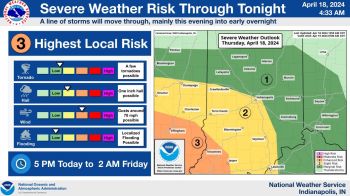(INDIANAPOLIS) – The polls open at 6 a.m. Tuesday for Indiana’s primary election.
Voters are choosing nominees for Congress, the General Assembly, and county and township offices, and selecting delegates to their parties’ state conventions next month. Many races are uncontested, including the one at the top of your ballot: U.S. Senator Todd Young (R) and Democratic challenger Tom McDermott are unopposed for their party nominations. But Democrats are choosing nominees in eight of Indiana’s nine congressional districts — Republicans are choosing four, including the night’s two most closely watched races. Nine Republicans are fighting for the nomination to replace retiring Congressman Trey Hollingsworth (R) in southeast Indiana’s Ninth District. Seven are competing to run against Democrat Frank J. Mrvan in northwest Indiana’s First District, believed to be the only seat with a realistic chance of flipping parties in November.
Mrvan, Democratic Congressman Andre Carson, and Republican Congressman Greg Pence have primary opponents of their own, though all three incumbents are heavily favored.
35 of the 125 state House and Senate districts on the ballot have contested primaries. For a third straight election, more than 20 General Assembly incumbents have primary challengers, including 19 House Republicans. Andy Downs with Purdue-Fort Wayne’s Center for Indiana Politics says it’s a byproduct of having so many safe districts. In both parties, he says a one-sided electorate encourages candidates from the far ends of the spectrum. And regardless of ideology, he says challengers are more likely to take on an incumbent when there’s little chance the other party will defeat him.
In addition to those challenges, redistricting pushed three pairs of Republican incumbents into primaries against each other, guaranteeing two House incumbents and one senator will lose their jobs. Redistricting may also mean you’re not voting for the congressman or state legislator you’re accustomed to voting for. Downs recommends double-checking which district you’re in — clerks heard from some early voters who didn’t understand why their legislator wasn’t on their ballot any more.













